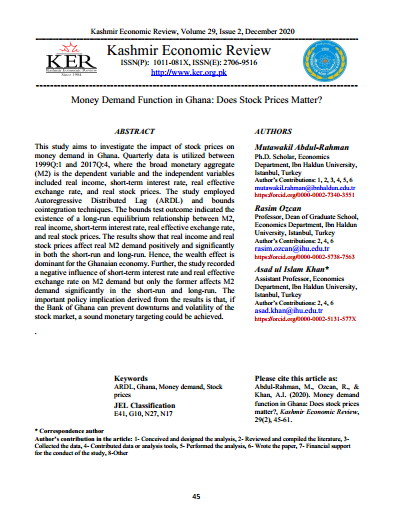Money Demand Function in Ghana: Does Stock Prices Matter?
##plugins.themes.bootstrap3.article.main##
Resumo
This study aims to investigate the impact of stock prices on
money demand in Ghana. Quarterly data is utilized between
1999Q:1 and 2017Q:4, where the broad monetary aggregate
(M2) is the dependent variable and the independent variables
included real income, short-term interest rate, real effective
exchange rate, and real stock prices. The study employed
Autoregressive Distributed Lag (ARDL) and bounds
cointegration techniques. The bounds test outcome indicated the
existence of a long-run equilibrium relationship between M2,
real income, short-term interest rate, real effective exchange rate,
and real stock prices. The results show that real income and real
stock prices affect real M2 demand positively and significantly
in both the short-run and long-run. Hence, the wealth effect is
dominant for the Ghanaian economy. Further, the study recorded
a negative influence of short-term interest rate and real effective
exchange rate on M2 demand but only the former affects M2
demand significantly in the short-run and long-run. The
important policy implication derived from the results is that, if
the Bank of Ghana can prevent downturns and volatility of the
stock market, a sound monetary targeting could be achieved.
##plugins.themes.bootstrap3.article.details##

Este trabalho encontra-se publicado com a Licença Internacional Creative Commons Atribuição-CompartilhaIgual 4.0.

